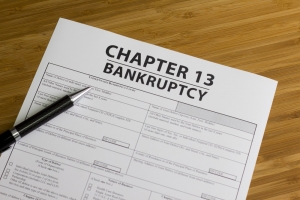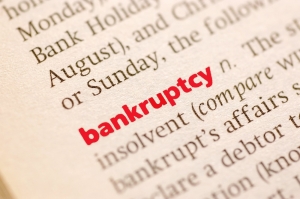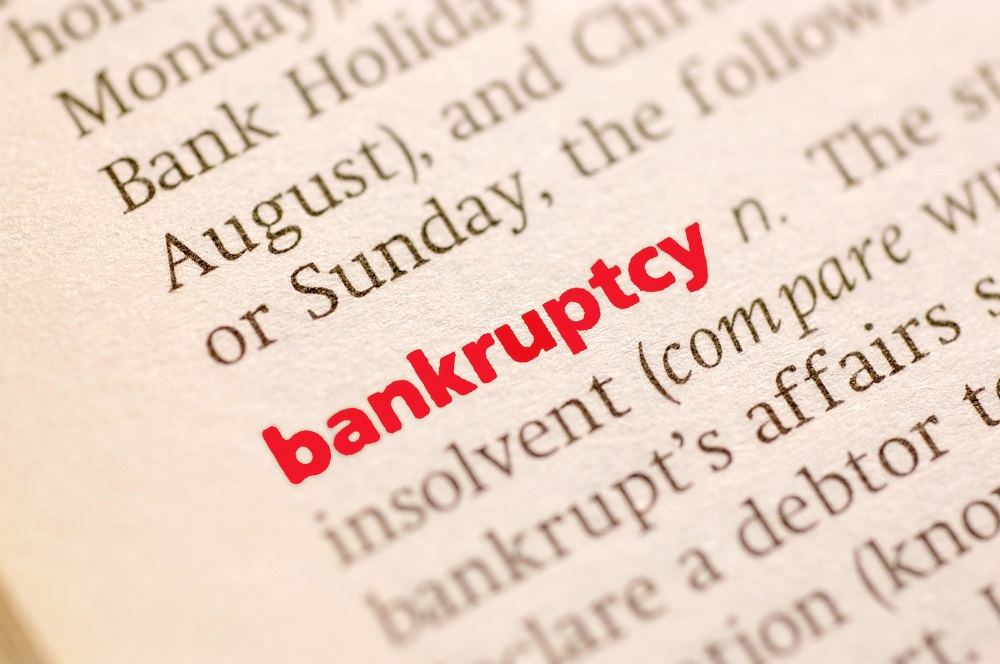Introduction to Marijuana Dispensaries and Bankruptcy
 The right to file bankruptcy in the United States has been established in the United States Constitution, under Article I, Section 8, clause 4 – also known as the Bankruptcy Clause.[i] Historically, debtors in England were placed in jail and the founding fathers did not want that to be what happened for individuals who fell into debt.[ii] The founding fathers wanted to give the debtor another option to kick start their financial stability. With that being said, it would be correct to think that with that clause, any person or any business would be able to file for bankruptcy – however that is not entirely true. Businesses that operate through the sale of marijuana are not eligible for bankruptcy in the United States.[iii] This is true even if the business is operating out of a state where the sale of marijuana is legal, such as Colorado.[iv]
The right to file bankruptcy in the United States has been established in the United States Constitution, under Article I, Section 8, clause 4 – also known as the Bankruptcy Clause.[i] Historically, debtors in England were placed in jail and the founding fathers did not want that to be what happened for individuals who fell into debt.[ii] The founding fathers wanted to give the debtor another option to kick start their financial stability. With that being said, it would be correct to think that with that clause, any person or any business would be able to file for bankruptcy – however that is not entirely true. Businesses that operate through the sale of marijuana are not eligible for bankruptcy in the United States.[iii] This is true even if the business is operating out of a state where the sale of marijuana is legal, such as Colorado.[iv]
Chapter 13 Bankruptcy for Small Businesses
Ordinarily small businesses turn to Chapter 13 bankruptcy for solutions. While Chapter 7 can be utilized for small businesses, Chapter 13 provides the ability for a business to operate during the repayment plan and continue to operate after the repayment program has been completed.[v] With a Chapter 7 bankruptcy, the debtor will have to liquidate most of their assets in an attempt to pay off what debts they hold before the court will discharge the debts all together.[vi] With the Chapter 13 bankruptcy, the debtor will propose a repayment plan to the court, which will be implemented once the court approves the plan.[vii]
 Chapter 13 bankruptcy allows the debtor to reorganize their debt, while paying whatever amount has been pre-approved by the courts.[viii] The debtor must show the court that disposable income that they have, through the payment plan, and where those funds are coming through.[ix] This is going to typically be from the business, when a business is filling for Chapter 13 bankruptcy. The court does not usually think twice about the debtor’s income being used to pay off the debts, but with businesses that are not abiding by federal law – it might turn a few heads. Even though marijuana dispensaries are legitimate businesses in the states where they are conducting business, the state laws permitting the sale of marijuana is in direct conflict with the federal laws that do not permit the sale of marijuana.[x] For this reason, the courts will not permit businesses to use the Chapter 13 bankruptcy plan because the source of their income is from violating federal law.
Chapter 13 bankruptcy allows the debtor to reorganize their debt, while paying whatever amount has been pre-approved by the courts.[viii] The debtor must show the court that disposable income that they have, through the payment plan, and where those funds are coming through.[ix] This is going to typically be from the business, when a business is filling for Chapter 13 bankruptcy. The court does not usually think twice about the debtor’s income being used to pay off the debts, but with businesses that are not abiding by federal law – it might turn a few heads. Even though marijuana dispensaries are legitimate businesses in the states where they are conducting business, the state laws permitting the sale of marijuana is in direct conflict with the federal laws that do not permit the sale of marijuana.[x] For this reason, the courts will not permit businesses to use the Chapter 13 bankruptcy plan because the source of their income is from violating federal law.
Violating Federal Law Yet Abiding by State Law
Many people do not realize that just because marijuana is legal for medical use in many states, and even recreational use in a few states, that use of marijuana in any setting is still a violation of federal law.[xi] There are current medical marijuana laws in 40 states, and yet the federal government retains its view that marijuana in any form is illegal – even with a medical marijuana card.[xii]
 To begin with, under the federal government there is no difference between medical marijuana use and recreation use – it is all illegal under federal law.[xiii] The federal government categorizes drugs through the Controlled Substances Act, and marijuana is treated like all the other controlled substances – such as cocaine and heroin.[xiv] Marijuana specifically is categorized as a Schedule I drug, which means it is viewed as highly addictive and having no medical value.[xv] The punishment under federal law for people found guilty of use, possession, or anything else relating to marijuana is very serious, and the punishment will remain even if the event took place in a state like Colorado or Oregon.[xvi]
To begin with, under the federal government there is no difference between medical marijuana use and recreation use – it is all illegal under federal law.[xiii] The federal government categorizes drugs through the Controlled Substances Act, and marijuana is treated like all the other controlled substances – such as cocaine and heroin.[xiv] Marijuana specifically is categorized as a Schedule I drug, which means it is viewed as highly addictive and having no medical value.[xv] The punishment under federal law for people found guilty of use, possession, or anything else relating to marijuana is very serious, and the punishment will remain even if the event took place in a state like Colorado or Oregon.[xvi]
One question many people may have is how is it possible to have a federal law forbid something and yet a state law permits the use of the same thing? Well, a ground breaking case that helped pave the way for how marijuana issues would be handled at both the state level and federal level was decided in 2005.[xvii] This case was the Gonzales v. Raich, and here the United States Supreme Court held that the federal government had the constitutional right to prohibit marijuana use.[xviii] Even with this decision, the Supreme Court did NOT say that the state laws that are in direct conflict with the federal government are unconstitutional nor does the decision invalidate those state laws.[xix] Finally, the decision does not say that the federal government MUST prosecute those in violation of the federal law – the discretion is up to the federal government, even if a state where marijuana use is legally permitted for medical or recreational use. With that in mind, states have begun to decide for themselves how to handle marijuana sales and what their laws should look like. While there has been some back and forth between state and federal governments on when to prosecute, in recent years a ruling was made that so long as a business was in compliance with their state laws, the federal government could not shut down a marijuana dispensary.[xx]
No Bankruptcy for Marijuana Businesses
Now, even though there is still a lot of tension between the federal government and state governments on how to prosecute or even proceed with marijuana possession – it tends to be an even game of tug of war. The state governments are able to pull away from the federal  government by permitting marijuana dispensaries to operate under state law. With that pull, the federal government has pulled back and decided that while the marijuana dispensaries are legally permitted under state law, bankruptcy options for those businesses are not an option.[xxi] While the federal government did not make this decision specifically for these types of businesses, the federal government is strongly upholding the law that was already established and applying it to these types of businesses.
government by permitting marijuana dispensaries to operate under state law. With that pull, the federal government has pulled back and decided that while the marijuana dispensaries are legally permitted under state law, bankruptcy options for those businesses are not an option.[xxi] While the federal government did not make this decision specifically for these types of businesses, the federal government is strongly upholding the law that was already established and applying it to these types of businesses.
The right to file for bankruptcy is a constitutional right afforded to United States citizens, so what is it exactly about marijuana dispensaries that cause such a commotion with filling? The business is legally operating under state law – and if there are any issues with noncompliance, the state will intervene. Ordinarily, a business will file for Chapter 13 bankruptcy – if they want to attempt to remain open during and after the bankruptcy.[xxii] The court will need to evaluate the income of the business and even though it is not usually an issue, a business that violates federal law will be heavily scrutinized and will not be permitted to continue with the bankruptcy proceeding.[xxiii] Bankruptcy court and bankruptcy laws are federally driven. Even though many states have their own exemptions and procedures for bankruptcy, the federal law will still guide the majority of the proceeding. It is for this reason that the courts will not permit marijuana dispensaries for file for bankruptcy.
What is Next for Marijuana Dispensary Businesses that are Insolvent?
So what options are left for businesses that operate legally under state law but are in violation of federal law because the business sells marijuana? A business in Colorado – where marijuana is both legal for medical purposes and recreational purposes, became insolvent and still filed for Chapter 7 bankruptcy.[xxiv] The trial court dismissed the petition for Chapter 7 bankruptcy stating that the business had given up the protections of bankruptcy when they operated a business in violation of federal law.[xxv] The business owners decided to appeal the decision for the bankruptcy appellate court, and the bankruptcy appellate court affirmed the decision.[xxvi] The business owners decided to fight even further and appealed to the tenth circuit court of appeals for a decision on the matter. The case was brought late in 2015 and the court is still out on the decision. If the court determines that the bankruptcy court was wrong in deciding to decline the petition – it will be groundbreaking for the businesses that need to seek bankruptcy but have been unable to previously. For more information see the article from the American Bar Association regarding Court’s not extending bankruptcy laws to marijuana businesses.
Conclusion
When you open a business, you are taking a lot of risks. You risk the possibility of the business failing and losing money. For small businesses, this is a huge gamble and for the businesses involved with marijuana sales – it is a gamble that has no net to fall back on. Even though these businesses are abiding by the state laws where their business operates, the federal laws still prohibit the sale of marijuana. Marijuana dispensaries are violating federal law during the operation of their business and as such, the federal government does not permit these businesses to have the fall back of bankruptcy – even though it is a constitutional right. The federal government does not allow a mafia business to file for bankruptcy, and they are in violation of federal law – so why should any another business that is in violation be permitted to do so?
There are actually a lot of reasons why the federal government should eventually change their standards and become more in line with state regulations on the sale of marijuana. In 2014, more than 1.5 million people purchased marijuana from a dispensary for either medical or recreational use.[xxvii] In Colorado and Washington there are retail marijuana shops – the first in the United States, and the business had $370 million dollars in sales from marijuana products in the year 2014 alone.[xxviii] Not only would the United States be able to increase revenue with more accessibility to marijuana sales, there would likely be more widespread research on the use of marijuana.[xxix] While many people are avidly against the use of marijuana, the numbers of sales alone show how many people are accepting of this drug. With an industry booming as much as this one is, it seems out of place to not afford those businesses the same protections for if the business starts to fall in financial ruin. Bankruptcy protections are afforded for so many small and big businesses, and hopefully it’ll be a matter of time before those protections can be stretched to reach over the marijuana industry again.
[i] See No Bankruptcy for Medical Marijuana Businesses. Cannabis Law Group Medical Marijuana Lawyers. (Published October 15, 2015). http://www.marijuanalawyerblog.com/2015/10/no-bankruptcy-for-medical-marijuana-businesses.html
[ii] Id.
[iii] See Courts Decline to Extend Bankruptcy Laws to Marijuana Businesses. ABA Journal. (Published February 01, 2016). http://www.abajournal.com/magazine/article/courts_decline_to_extend_bankruptcy_laws_to_marijuana_businesses
[iv] Id.
[v] See An Overview of Chapter 13 Bankruptcy. NOLO Legal Encyclopedia. (Accessed May 12, 2016). http://www.nolo.com/legal-encyclopedia/chapter-13-bankruptcy-overview-30099.html
[vi] See A Chapter 7 Bankruptcy Overview. NOLO Legal Encyclopedia. (Accessed May 12, 2016). http://www.nolo.com/legal-encyclopedia/chapter-7-bankruptcy-overview-29571.html
[vii] See An Overview of Chapter 13 Bankruptcy. NOLO Legal Encyclopedia. (Accessed May 12, 2016). http://www.nolo.com/legal-encyclopedia/chapter-13-bankruptcy-overview-30099.html
[viii] Id.
[ix] Id.
[x] See Medical Marijuana and Federal Law. Criminal Defense Attorney, NOLO Legal Encyclopedia. (Accessed May 12, 2016). http://www.criminaldefenselawyer.com/resources/criminal-defense/federal-crime/medical-marijuana-federal-laws.htm
[xi] Id.
[xii] See Federal Marijuana Law. Americans for Safe Access. (Accessed May 12, 2016). http://www.safeaccessnow.org/federal_marijuana_law
[xiii] Id.
[xiv] Id.
[xv] Id.
[xvi] Id.
[xvii] Id.
[xviii] Id.
[xix] Id.
[xx] See Chris Roberts. Court: Feds Can’t Shut Down State-Legal Cannabis Businesses. SF Weekly News. (Published October 20, 2015). http://www.sfweekly.com/thesnitch/2015/10/20/court-feds-cant-shut-down-state-legal-cannabis-businesses
[xxi] See No Bankruptcy for Medical Marijuana Businesses. Cannabis Law Group Medical Marijuana Lawyers. (Published October 15, 2015). http://www.marijuanalawyerblog.com/2015/10/no-bankruptcy-for-medical-marijuana-businesses.html
[xxii] See An Overview of Chapter 13 Bankruptcy. NOLO Legal Encyclopedia. (Accessed May 12, 2016). http://www.nolo.com/legal-encyclopedia/chapter-13-bankruptcy-overview-30099.html
[xxiii] Id.
[xxiv] See No Bankruptcy for Medical Marijuana Businesses. Cannabis Law Group Medical Marijuana Lawyers. (Published October 15, 2015). http://www.marijuanalawyerblog.com/2015/10/no-bankruptcy-for-medical-marijuana-businesses.html
[xxv] Id.
[xxvi] Id.
[xxvii] See Matt Ferner. Legal Marijuana Is the Fastest Growing Industry in the US: Report. Huffpost Business. (Published January 26, 2015). http://www.huffingtonpost.com/2015/01/26/marijuana-industry-fastest-growing_n_6540166.html
[xxviii] Id.
[xxix] Id.



